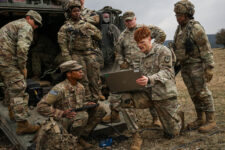 Omaha: What if you crafted an international nuclear arms agreement and didn’t get all the major nuclear powers to sign on? That’s sort of the position the United States finds itself in as it pursues an international code of conduct designed to encourage international space cooperation to limit space debris and encourage information sharing about potential problems.
Omaha: What if you crafted an international nuclear arms agreement and didn’t get all the major nuclear powers to sign on? That’s sort of the position the United States finds itself in as it pursues an international code of conduct designed to encourage international space cooperation to limit space debris and encourage information sharing about potential problems.
Russia, India and the European Union all seem amenable to some sort of voluntary international agreement based on the European Union’s Space Code of Conduct. But China? Not so much.
The State Department official charged with the day-to-day work on this issue, Frank Rose, sat down with me here and made it very clear that China has declined to even discuss the concept, let alone engage in discussions or negotiations about how to implement such an agreement.
Rose said that there have been “no substantive discussions” with China. However, “the U.S. is very interested in having this dialog with China,” he added. Pressed, he conceded that we may not very far. “I think it’s probably unlikely we will change their views,” Rose said.
It’s not for lack of trying that the State Department isn’t getting very far. One year ago, the State Department warned the Chinese that debris from the weather satellite they destroyed in their 2007 anti-satellite test would pass close to one of their own satellites. As I reported at the time, it was never clear to American officials whether the Chinese listened to us or believed us.
And China, Rose said, has not met with State Department officials to discuss the space code of conduct.
Supporters of the code of conduct approach argue that even if China or other major space powers don’t sign on, it will lead them to behave better.
In a Taiwan conflict, tough choices could come for Big Tech
Washington could do more to incentivize tech companies to distance themselves from China, but CEOs should examine how they’d react to a fight in the Pacific, CSET’s Sam Bresnick and Emelia Probasco argue.


























